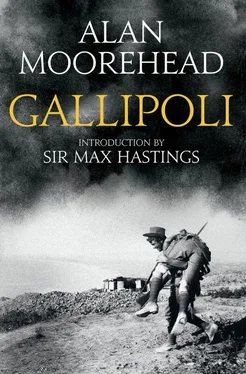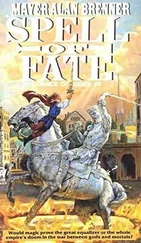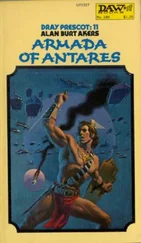But now a new factor came into the scene. General Sir William Birdwood was sent out to the Dardanelles to report on the military position there, and one of his earliest messages to Kitchener on March 5 was disturbing. He did not believe, Birdwood said, that the Fleet would get through by itself; the Army would have to come in.
One sympathizes with Kitchener, for the situation was complicated. At one moment he is offered a Greek army and at the next it is snatched away. On March 2 Garden says he can get through. On March 5 Birdwood says he cannot. Nobody at this stage, not even Carden who is ill or Fisher who dislikes the whole design, suggests that the operations should be abandoned. As Churchill wrote later, ‘Everybody’s blood was up’: the excitement of a naval battle, the sudden vision of spectacular success it had conjured up, the historic ground, the daring of the enterprise — all these things had captivated people’s minds, and Kitchener himself at last fell under the Gallipoli spell. On March 10 he announced that the 29th Division was to go after all, and that he had arranged for the French to send a division as well. This meant that, with the Anzac divisions, there would be an Army Corps of some seventy thousand men in the field.
No one knew yet what this large force was to do or precisely where it was to go, or what allies and enemies it would gather on its way. Despite Birdwood’s report it was still thought that the Navy would break through alone, and still no one suggested that it should suspend its operations until the Army arrived so that the two forces could attack together.
Something of the confusion and the vagueness — the remarkable blending of precipitancy and hesitation — that governed the situation in London at this time can be glimpsed from the circumstances in which General Ian Hamilton, an old comrade of Kitchener’s from the South African war, was appointed to command this new army that had drifted into being. It was on the morning of March 12 that Hamilton was told of his appointment. He himself has described the scene:
‘I was working at the Horse Guards when about 10 a.m. K. sent for me. I wondered. Opening the door I bade him good morning and walked up to his desk where he went on writing like a graven image. After a moment, he looked up and said in a matter-of-fact tone, “We are sending a military force to support the Fleet now at the Dardanelles, and you are to have command… ”
‘K., after his one tremendous remark, had resumed his writing at the desk. At last, he looked up and inquired, “Well?”
‘ “We have done this sort of thing before, Lord K.,” I said; “We have run this sort of show before and you know without saying I am most deeply grateful and you know without saying that I will do my best and that you can trust my loyalty — but I must say something — I must ask you some questions.” Then I began.
‘K. frowned; shrugged his shoulders; I thought he was going to be impatient, but although he gave curt answers at first he slowly broadened out, until at the end no one else could get a word in edgeways.’
Lord Kitchener, however, was not able to be very explicit, for until the Navy had launched its attack on March 18 neither he nor anybody else had any clear notion of what Hamilton was to do. General Caldwell, the Director of Military Operations, was called in and although he was able to produce a map of the Gallipoli area (which subsequently turned out to be quite inaccurate), the sum of his knowledge of the situation appeared to be confined to a plan for a landing on the southern part of the Gallipoli peninsula which had been worked out by the Greek General Staff some months before. The Greeks, Caldwell said, had estimated that they would require 150,000 men.
Kitchener dismissed this idea at once. Half that number, he said, would do Hamilton handsomely. The Turks were so weak on the peninsula that if a British submarine managed to get through the Narrows and wave the Union Jack outside the town of Gallipoli the whole enemy garrison would take to its heels and make a beeline for Bulair.
At this point General Wolfe Murray, the Chief of the Imperial General Staff, and General Archibald Murray, the Inspector of Home Forces, came into the room together with General Braithwaite, who had been appointed Hamilton’s chief-of-staff. None of them had heard of this plan for a Gallipoli campaign before and the Murrays were so taken aback that neither of them ventured to comment.
However, Braithwaite spoke. According to Hamilton: ‘He only said one thing to K. and that produced an explosion. He said it was vital that we should have a better air service than the Turks in case it came to fighting over a small area like the Gallipoli peninsula; he begged, therefore, that whatever else we got, or did not get, we might be fitted out with a contingent of up-to-date aeroplanes, pilots and observers. K. turned on him with flashing spectacles, and rent him with the words, “ Not one ”.’ [5] It was left to the Navy to supply aircraft for the operation.
Returning to the War Office next morning Hamilton found Kitchener ‘standing at his desk splashing about with his pen at three different drafts of instructions’. There were but three or four essential points in the document that finally emerged; Hamilton was to hold back his troops until the Fleet had made its full-scale attack on the forts at the Narrows. If this attempt failed he was to land on the Gallipoli peninsula; if it succeeded he was to hold the peninsula with a light garrison and advance directly upon Constantinople, where it was hoped he would be joined by a Russian corps which would be landed on the Bosphorus.
In no circumstances was Hamilton to proceed until his whole force was assembled and he was not to fight on the Asiatic side of the Dardanelles.
‘He toiled over the wording of his instructions,’ Hamilton says in his diary. ‘They were headed “Constantinople Expeditionary Force”. I begged him to alter this to avert Fate’s evil eye. He consented and both this corrected draft and the copy as finally approved are now in Braithwaite’s dispatch box more modestly headed “Mediterranean Expeditionary Force”. None of the drafts helps us with facts about the enemy; the politics; the country, and our allies, the Russians. In sober fact these “instructions” leave me to my own devices in the East.
‘So I said good-bye to old K. as casually as if we were to meet together at dinner. Actually my heart went out to my old chief. He was giving me the best thing in his gift and I hated to leave him among people who were frightened of him. But there was no use saying a word. He did not even wish me luck and I did not expect him to, but he did say, rather unexpectedly, after I had said good-bye and just as I was taking up my cap from the table, “If the Fleet gets through, Constantinople will fall of itself and you will have won, not a battle, but the war”.’
By now there had been assembled some thirteen officers who were to act on Hamilton’s staff. Most of these were regular soldiers, but there were one or two who, Hamilton says, had hastily put on uniform for the first time in their lives: ‘Leggings awry, spurs upside down, belts over shoulder straps! I haven’t a notion of who they all are.’ Others again who were to handle the administration and quartermastering of the headquarters he failed to meet at all, since they had not heard of their appointments as yet.
However, the paramount need now was haste, and at 5 p.m. on Friday, March 13, the party, armed with the instructions, the inaccurate map, a three-years-old handbook on the Turkish Army and a pre-war report on the Dardanelles defences, proceeded to Charing Cross station. Churchill, who had been pressing strongly for their immediate departure, had made all the arrangements; a special train was waiting to take them to Dover where they were to cross to Calais on H.M.S. Foresight. At Calais another special express would take them through the night to Marseilles, where H.M.S. Phaeton , a 30-knot unarmoured cruiser, was commissioned to convey them to the Dardanelles.
Читать дальше












